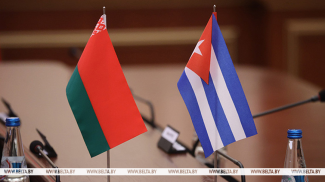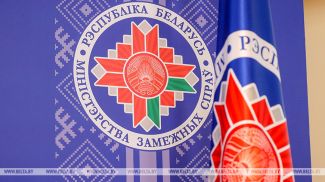MOSCOW, 7 July (BelTA) – The impunity of collaborators who committed crimes during the Great Patriotic War and took refuge in Western countries paves the way for the glorification of Nazism, Belarus' Prosecutor General Andrei Shved said at a conference of heads of prosecution services of European countries in St Petersburg on 7 July, BelTA has learned. The conference was organized by the Office of the Prosecutor General of Russia in association with the Council of Europe and the International Association of Prosecutors (IAP).
In his speech, Andrei Shved recalled that more than 140 large-scale punitive operations were carried out on the territory of modern-day Belarus during the Great Patriotic War. As a result, almost 10,000 villages were destroyed, about 400,000 people were deported from Belarus as slave laborers, of whom tens of thousands died unable to withstand the harsh conditions of exploitation. In Belarus, there were over 400 places of forced detention of civilians, 260 killing sites and 170 ghettos, in which at least 1.5 million people were killed. “In particular, more than 200,000 people were murdered in the Trostenets concentration camp. The exact number of victims and their identity have not been established to this very day. A special commission that studied burial places determined the approximate number of victims based on the volume of ash left after the burning of dead bodies. In total, according to contemporary estimates, Belarus lost about three million civilians, or roughly a third of its population during the German occupation,” the prosecutor general said.
Andrei Shved recalled Soviet Prosecutor General Aleksandr Sukharev who said that the verdict of the Nuremberg Trials laid the foundation for modern individual rights and freedoms. The conceptual decisions of the Nuremberg Trials, assumed by the United Nations as the principles of post-war international humanitarian and criminal law, helped to maintain peace and respect for human dignity for decades. “However, despite the obvious atrocities only a fraction of Nazi war criminals has been convicted in the Nuremberg Trials and other trials,” Andrei Shved said. “The accomplices from among collaborators who committed war crimes in Belarus went unpunished. Some of them are still alive and have not received the punishment they deserve. We know the whereabouts of more than 400 of them in more than ten countries. This fact creates the grounds for glorification of Nazism and destruction of ideological values,” he said.
In order to observe the principle of unavoidability of punishment, to restore the historical and social justice, the Prosecutor General's Office has opened and is investigating a criminal case into the genocide of Belarusian people through mass killings, destruction of villages together with residents, forced deportation for forced labor, killings in concentration camps and death camps. “Belarus has put together a team of prosecutors and investigators to work on the criminal case,” Andrei Shved said. “I would like to point out that the Belarusian law enforcement agencies have everything necessary for a thorough, comprehensive, and professional investigation into those crimes. A special team of historians specializing in the history of the Great Patriotic War and contemporary history are responsible for scientific support of the investigation. We peruse the data from archives. The algorithm of the investigation is as follows: prosecutors in Belarusian regions together with representatives of local self-governing bodies identify and question living witnesses to those crimes. Together with specialists in local history and workers of museums, they ascertain facts of killing civilians, burning villages, and so on. When they get information about a possible site of a mass shooting, they explore the vicinity together with eyewitnesses to find the exact location. After that, excavations are carried out at the probable site to recover the remains of victims and discover the cause of death,” he explained.
The conference in St Petersburg will last till 9 July. Participants of the conference are expected to discuss the role of prosecutors in criminal cases, civil cases, and administrative cases, prosecution oversight outside the sphere of criminal law, problems of counteracting cybercrimes, illegal migration and ecological crimes. Andrei Shved presented a report on protecting rights of the individual and the society in connection with an investigation into the genocide of the BSSR population during the Great Patriotic War. Belarus views the conference as an opportunity for an open dialogue and for delivering objective information about the situation in Belarus, for sharing cutting-edge experience of prosecution oversight with foreign prosecution and justice bodies and international organizations. It is also an opportunity for the Office of the Prosecutor General to develop international contacts.













